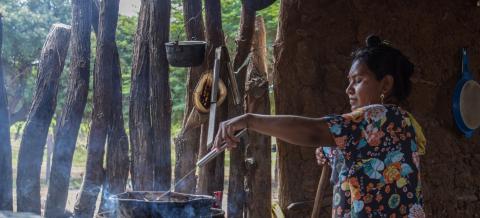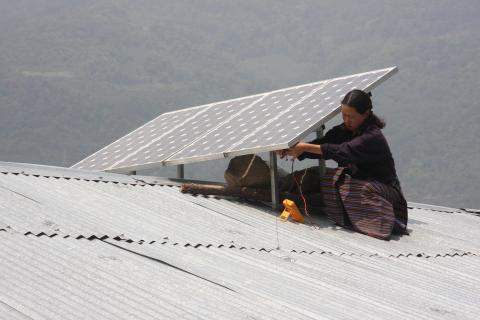
EITI: Pressing for Progress on Gender
EITI: Pressing for Progress on Gender
Seven suggestions to support women’s leadership in the extractive sectors.
Have you ever noticed that you are the only female sitting at the table?
In some countries, this is quite glaring, especially when having a conversation about the governance of the oil, gas and mining sectors. These sectors can have significant social, economic and environmental impacts on affected communities. They can change the natural environment, employment opportunities, the cost of living and social dynamics. Negative impacts are frequently faced by women and girls and the most vulnerable and most marginalized members of those communities.
Extractive projects can lead to the loss of traditional livelihoods and women losing access to land, used for agricultural subsistence or for necessities such as firewood. The increased wealth in an otherwise poor community, can force some women to engage in other activities such as sex work, increasing the risk to women of experiencing sexual and gender-based violence. Although men may have greater access to jobs, women may be excluded from community consultations and allocation of community development funds.
Transparency, accountability, consultations and good governance are key elements of well-managed natural resources. Efforts to enhance women’s participation in decision-making around the management, development and use of those resources should be also part of a wider agenda to ensure that extractive resources are managed fairly and in the best interest of all citizens.
In the EITI gender equality brief, the EITI makes concrete suggestions to ensure that women are not only sitting at the table but are participating in a meaningful way in the governance of the sector:
- The EITI, at the global and national level, should ensure that women play a leading role in the consultation and decision-making processes involved in overseeing implementation of the EITI.
- In developing the objectives for EITI implementation and writing their work plans, multi-stakeholder groups should consider how the development of the extractive industries can contribute towards achieving gender equality (SDG 5), and the opportunities for the EITI to promote gender equality. EITI multi-stakeholder groups should consider opportunities to collect gender disaggregated data in the extractive industries (employment, local procurement, training, etc) and disclose this information publicly.
- EITI multi-stakeholder groups should ensure that EITI communication and disseminations activities are widely accessible, and that they promote gender equality and work to address and change the attitudes, values and social norms that perpetuate gender inequality. EITI multi-stakeholder groups are encouraged to identify ways to help address the different needs of women and men through laws, policies, and services.
- EITI multi-stakeholder groups are encouraged to track payments made to governments from extractive operations.
- EITI multi-stakeholder groups are encouraged to document activities aimed at gender equality in their annual progress reports.
- EITI Validation should consider the impact of the EITI on gender equality.
- The International Secretariat should continue to raise awareness, and document case studies and impact stories.
Implementing countries are already looking at the gender impacts of their work.
Gender-disaggregated EITI data is already being disclosed in some EITI Reports, particularly with respect to employment statistics. For example, the Philippines 2016 EITI Report, includes a summary of employment data by participating entities for 2014. Some implementing countries, such as Burkina Faso in their 2015 report, also capture the socio-environmental impact of artisanal mining, which is often particularly problematic for women. Zambia EITI confirmed that it has made presentations to various women's organizations on licensing procedures as part of its outreach work and Myanmar EITI noted that women have been actively involved in organizing dissemination activities.
The EITI continues to press for change to ensure that the Sustainable Development Goal 5, achieving gender equality and empowerment of all women and girls. The EITI will conduct further work on gender equality in 2018, including seeking to identify and address gaps in knowledge and coordination on gender issues related to the EITI implementation and impact.



